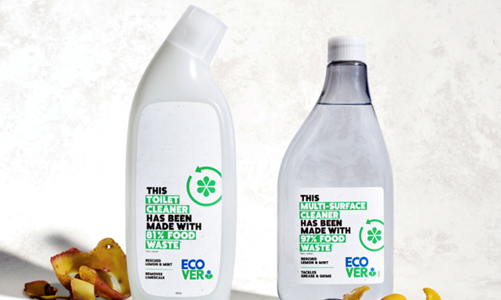Ecover proudly presents two revolutionary cleaning products: Too Good To Waste® all-purpose cleaner and toilet cleaner. Innovations that show how the cleaning industry can use food waste to reduce its carbon emissions. An important development because the raw materials that are processed in cleaning products have a major impact on the CO2 footprint. With a focus on reducing those carbon emissions, the company, which has been at the forefront of the cleaning industry for over 40 years, has teamed up with like-minded partners to develop this new cleaning duo, which primarily uses salvaged food waste.
The Too Good To Waste® all-purpose cleaner and toilet cleaner are made with 97 and 81 percent rescued food waste* respectively. Both limited edition products are proven effective cleaners, with the all-purpose cleaner removing grease and dirt and the toilet cleaner removing limescale.
Challenging the throwaway culture
The bottles are made from recycled plastic and the all-purpose cleaner is deliberately supplied without a spray head, saving 35 percent of plastic and encouraging the reuse of spray heads from existing cleaning bottles.** After all, why make a new head when you can reuse your old cleaning bottle can easily be reused? The brand sees the launch of Too Good To Waste® as another opportunity to challenge throwaway culture and encourage people to rethink the value of waste. Something that is closely aligned with the brand's mission: Since its start in 1979, Ecover has been redefining the true meaning of 'clean'. The groundbreaking products are formulated in Ecover's Belgian ecological factory, the first of its kind, built in 1992 with 90 percent recycled or renewable materials.
“Waste is only waste if you waste it”
An Ecover spokesperson said: “As a pioneer of sustainability in the cleaning industry, Ecover is passionate about sharing his vision of the future of cleaning ingredients and how progress can be made. We have long believed that companies have both an opportunity and an obligation to make the world a better place.
In 2019, we launched our limited-edition Too Good To Waste® dishwashing liquid, made from beer waste. But we didn't want to stop there. Our latest Too Good To Waste® products are the result of our challenge to ourselves and our trusted partners to think even further about how we can revolutionize the cleaning category by treating waste as an asset. After all, waste is only waste if you waste it.”
Together against waste
Ecover is proud to be working with partners of the Waste2Func project, funded by Circular Bio-Based Europe (CBE JU), to bring these leading products to life.
Nicoló Giacomuzzi-Moore, Interim Executive Director of CBE JU, which contributed 6.7 million euros to the Waste2Func project that led to these revolutionary cleaning products, comments on the collaboration: “The launch of these two highly innovative products on the market is an important milestone for CBE JU, as they represent our vision of a circular biobased economy in Europe. By converting food waste from agriculture, food industry, supermarkets and restaurants into high-quality ingredients for household products such as these cleaning products, the project will contribute to a reduction of industrial CO2 emissions, an increase in the value of food waste and the creation of high-tech jobs in Europe.”
